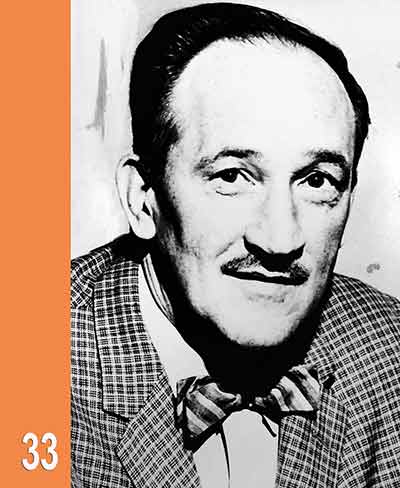Don Whitehead
Induction Year:¬Ý1993
Lived:¬Ý1908-1981
Papers:
LaFollette Press; Harlan (Ky.) American; Harlan (Ky.) Enterprise
Knoxville Journal; Associated Press; New York Herald-Tribune; Knoxville News-Sentinel
The first news story that Don Whitehead wrote was rejected, but he was not discouraged and went on to win two Pulitzer Prizes for war reporting. When Donald Ford Whitehead was 10 he wrote a story about a murder he witnessed in his boyhood town of Harlan, Kentucky. Days later, he approached the editor of the local newspaper with an article on the incident and received a lesson about timeliness. "Can't use it, son," the editor said.
"Everybody in town knows about that shooting."
Whitehead was born on April 8, 1908, in the coal-mining town of Inman, Virginia, and later moved with his family to Harlan. Fascinated by newspapers from a young age, Whitehead edited the sports section of his high school newspaper, and later joined the staff of his college newspaper while attending the University of Kentucky. Whitehead left the university in 1928 to work for the LaFollette Press, published by his brother, Kyle. Whitehead left LaFollette in 1930 to return to Kentucky to work as managing editor of the Harlan American, and later as city editor of the Harlan Enterprise. In 1934 Whitehead went to work as a reporter for the Knoxville Journal, and a year later he joined the Associated Press, first as a night editor in Memphis and later as a correspondent in Knoxville.
Whitehead's skill as a feature writer earned him a promotion to the AP's New York bureau in 1941, on the eve of the United States' entrance into World War II. He began his career as a war correspondent in 1942 when he was sent overseas to cover the British Army's attempt to defeat German forces led by Marshal Erwin Rommel.
During World War II Whitehead earned the nickname "Beachhead Don" because he was present at so many Allied landings. In all, Whitehead reported on five Allied landings including Sicily and Normandy. He also reported on some of the most dramatic events of the war, including the liberation of Paris, the meeting of Russian and American troops at the Elbe River, and the liberation of the Buchenwald concentration camp.
After the war Whitehead worked as AP bureau chief in Honolulu, and later as a congressional reporter in Washington, D.C. In 1950 he was sent to cover the Korean War, and he distinguished himself as one of the leading journalists to cover the conflict.
In 1951 Whitehead was awarded the Pulitzer Prize for his reporting on the conflict, the George Polk Memorial Award for wire service reporting, and the Sigma Delta Chi Distinguished Service Award. In 1952 Whitehead won another Pulitzer, this time for international reporting on a secret fact-finding trip to Korea taken by President-elect Dwight Eisenhower.
In 1956 Whitehead wrote The FBI Story, which traced the history of the crime-fighting agency. He later wrote Journey into Crime, a collection of articles on international police work; The FBI Story for Young Readers; Border Guard, a history of the United States Customs Service; The Dow Story, a history of Dow Chemical Company; and Attack on Terror, a book on the FBI's battle against the Ku Klux Klan in Mississippi.
Whitehead left the AP in 1956 to become Washington bureau chief for the New York Herald Tribune. He held the position for a year and a half, retiring to Knoxville in 1959 when he became a columnist for the Knoxville News-Sentinel.
Whitehead was remembered as a reporter who valued accuracy in reporting, and decried the interjection of bias into news stories. Wes Gallagher, a World War II correspondent who served with Whitehead, described the newsman as a capable and hard-working reporter, who could always be counted on to get the story.
